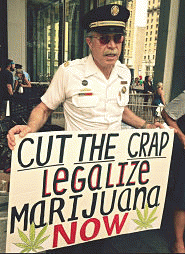A few hours before the Democrat Party made history on July 26,2016 with the nomination of the first female to head a major party presidential ticket in America, Ray Lewis stood across from Philadelphia's City Hall holding a sign that contradicted the position of his previous profession: policeman.
Standing about four miles from the meeting site of the Democratic National Convention (DNC), Lewis, a retired Philadelphia Police Department captain, held a sign demanding the legalization of marijuana.
Support for reform of laws criminalizing marijuana is included in the DNC's Platform. But the legalization advocated by Lewis and millions across America is not a position held by Hillary Clinton, the Democratic Party's official candidate for the 2016 presidential election. Clinton's vice-presidential pick, Virginia U.S. Senator Tim Kaine also opposes legalization.
Donald Trump, the Republican Party candidate for president, also opposes legalization. Trump has adopted the same 'Law-&-Order' campaign mantra of Richard Nixon, the discredited former U.S. President who launched the 'War on Weed' in the early 1970s"a few years before Nixon's unprecedented resignation for serial misconduct. Trump's VP pick, Indiana Governor Mike Pence, opposes legalization.
Former law enforcer Ray Lewis quickly cited his past experiences as a policeman when asked why he endorses the legalization of the long outlawed marijuana.

Ray Lewis - Retired Philadelphia Police Department captain LBW Photo
(Image by Linn Washington Jr.) Details DMCA
"As an ex-cop, without a doubt, I know [marijuana] should be legal. It is a disgrace that we arrest and incarcerate for something that is less dangerous than alcohol and tobacco, two substances that are legal," Lewis said.
"White America needs to know that marijuana is not the problem. The problem is the prohibition of marijuana," Lewis said before his presentation at a pro-pot/anti-Drug War rally across from Philadelphia's City Hall where many in attendance openly consumed the illegal substance.
"The trillions of dollars spent on marijuana enforcement over the years could have been spent to change conditions like poverty and poor education in our schools," Lewis noted.
The legal and social status of marijuana is the subject of intense debate and reexamination in America. Public opinion polls in recent years register a majority of Americans supporting legalization including increasing numbers of conservative Republicans.
While federal law stills bars all possession and use of marijuana over two-dozen states and Washington, DC now allow the medical use of marijuana.
Further, four states and Washington DC have fully legalized marijuana for adult use. Tens-of-millions in new tax revenues from marijuana sales have flowed into coffers of states that have legalized marijuana. (Legalized marijuana sales/use in DC sparked opposition from Republicans in Congress delaying implementation.)
Philadelphia is the largest city in America to decriminalize possession of small amounts of marijuana, treating possession with a traffic ticket like citation instead of the former practice of expensive custodial arrests and court adjudications.
Retired police captain Ray Lewis criticized the documented racial discrimination in marijuana law enforcement where African Americans sustain more severe enforcement than whites despite white using marijuana more than blacks.
Prejudicial policing that targeted African-Americans triggered approval of decriminalization in Philadelphia in 2014.
Yet, despite Philadelphia's decriminalization blacks remain the predominant persons arrested for marijuana violations in the city. In 2015 black adults comprised 82 percent of all marijuana enforcement arrests while black teens totaled 74% of juvenile arrests according to an analysis of law enforcement statistics conducted by Chris Goldstein, author of the Philly 420 Blog. Philly.com, the web portal of the company that owns the city two largest daily newspapers, publishes the 420 Blog.
(Note: You can view every article as one long page if you sign up as an Advocate Member, or higher).




